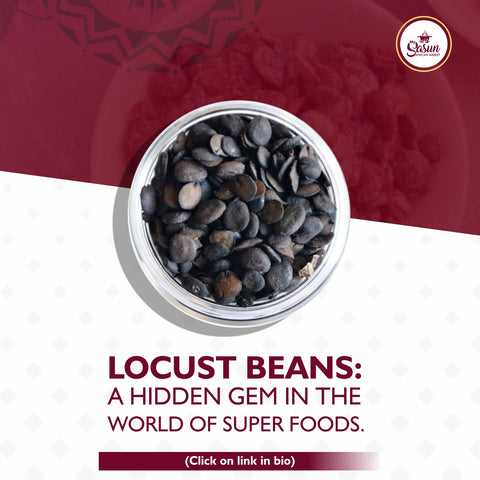Potash, known as "Kaun" or "Akanwu" in West African cuisines, is a vital ingredient that plays a significant role in the preparation of traditional dishes. Its distinctive alkaline properties make it a versatile addition to various recipes. However, like any cooking ingredient, it comes with both benefits and precautions that every West African home chef should be aware of. In this blog post, we will delve into the world of potash and explore its health benefits, as well as the precautions that need to be observed when using it in your cooking. Understanding the proper use of potash can not only enhance the flavors of your dishes but also contribute to a healthier and more enjoyable cooking experience.

READ LOCUST BEANS: A HIDDEN GEM IN THE WORLD OF SUPERFOODS.
UNDERSTANDING POTASH
Before we delve into the health benefits and precautions, let's first understand what potash is. Potash is a general term that refers to various potassium compounds, typically potassium carbonate or potassium hydroxide. In West African cooking, it is known as "Kaun" or "Akanwu." This ingredient is crucial for its ability to soften and adjust the texture of certain dishes. Potash Akanwu is used in African kitchen as meat tenderizer & to soften other dishes like beans, vegetables and peas while cooking, enhancing their consistency and texture.
HEALTH BENEFITS OF POTASH
Potash, when used in moderation, can offer some potential health benefits:
- Aid in Digestion: Potash is believed to aid in digestion by promoting the breakdown of food in the stomach. It can help alleviate digestive discomfort.
- Nutrient Absorption: The alkaline nature of potash may enhance the body's ability to absorb essential nutrients from the foods you consume.
- Alkalizing Effect: Potash has an alkalizing effect on the body, which can help maintain a balanced pH level. An overly acidic body can be a breeding ground for various health issues, and potash can help counteract this.
- Heart Health: Some studies suggest that potassium-rich foods, including those that contain potash, may help regulate blood pressure, reducing the risk of hypertension and related cardiovascular issues.
- Muscle Function: Potassium is essential for normal muscle function, and potash as a source of potassium can aid in muscle contractions and overall muscle health.
- Electrolyte Balance: Potash, with its alkaline properties, plays a role in maintaining the body's electrolyte balance, which is critical for various bodily functions.
- Bone Health: Adequate potassium intake, which can be supported by potash in the diet, may contribute to better bone health, potentially reducing the risk of osteoporosis.
- Alleviation of Morning Sickness: Some pregnant women use potash to alleviate morning sickness and indigestion, but this should be done under medical supervision.
- Relief from Itching: Topically, potash has been used to relieve itching from insect bites and stings due to its alkaline nature.
PRECAUTIONS WHEN USING POTASH
While potash can offer benefits, it's crucial to exercise caution and use it sparingly:
- Moderation is Key: Potash should be used in moderation. Excessive use can lead to health issues as it is highly alkaline and can disrupt the body's natural pH balance.
- Potential Side Effects: Overconsumption of potash may lead to side effects such as nausea, diarrhea, and stomach cramps. It's essential to be aware of your body's response.
- Special Considerations: If you have underlying health conditions, particularly related to kidney function or digestion, it's advisable to consult with a healthcare professional before incorporating potash into your cooking.
SAFE USAGE TIPS
To ensure the safe and responsible use of potash in your cooking, here are some tips:
- Measure Carefully: When using potash, always measure it precisely as directed in your recipes. Avoid guessing or adding too much as even a small amount can significantly impact the texture and flavor of your dish.
- Dissolve Properly: Ensure that potash is thoroughly dissolved in water before adding it to your dishes. This helps distribute it evenly and reduces the risk of concentrated pockets which can lead to an unpleasant taste or texture in your dishes.
READ TROPICAL HONEY AND SKIN CARE: DIY BEAUTY TREATMENTS TO TRY
- Learn from Experienced Cooks: If you are new to using potash, seek guidance from experienced West African cooks who can provide valuable insights and tips.
- Ventilation: When dissolving potash, ensure proper ventilation in your kitchen. The fumes produced during the process can be irritating, so good airflow can help mitigate this.
- Use the Right Type: Be aware of the specific type of potash you are using. Different dishes and recipes may call for different forms of potash, so make sure you have the appropriate variety on hand.
- Avoid Direct Contact: Avoid direct skin contact with undissolved potash or strong potash solutions, as it can be caustic and irritate the skin. If it comes into contact with your skin, rinse thoroughly with water.
- Keep out of Reach of Children: Potash should be stored safely out of the reach of children. The alkaline nature of potash makes it inappropriate for unsupervised use.
- Emergency Measures: In case of accidental ingestion of a significant amount of undissolved potash, seek medical attention immediately
ROUNDING OFF
Potash is a cherished ingredient with a rich history. While it can contribute to the flavors and textures of traditional dishes, its use comes with both benefits and precautions. Understanding the proper use of potash is essential for a safe and enjoyable culinary experience. By using potash in moderation, being aware of potential side effects, and following safe usage tips, you can make the most of this versatile ingredient.
At My Sasun African Store, we’re proud to bring you authentic African ingredients that help keep your meals flavorful and traditional. Whether you’re exploring local favorites or trying something new, we’ve got you covered.
Shop online at MySasun.com or download the MySasun app to order your essentials and enjoy the true taste of home—anytime, anywhere.







Comments (19)
How I got rid of human papilloma virus (HPV) with natural treatment. i was diagnosed with this virus for 5 years i broke up with my boyfriend because i contracted the virus from him, luckily i found a herbalist name Dr. Ogedegbe everyone testify good of his natural treatment i picked up his address and contacted him. he truly treated me with natural herbs in a week and i got cured. I share this post because ever since i got this treatment I’m perfectly ok with my health, you can get contact with him through his email address dr.ogedegbe6@gmail.com or whatsapp +2349121737553.
“In the crypto world, this is great news I want to share. Last year, I fell victim to a scam disguised as a safe investment option. I have invested in crypto trading platforms for about 10yrs thinking I was ensuring myself a retirement income, only to find that all my assets were either frozen, I believed my assets were secure — until I discovered that my BTC funds had been frozen and withdrawals were impossible. It was a devastating moment when I realized I had been scammed, and I thought my Bitcoin was gone forever, Everything changed when a close friend recommended the Capital Crypto Recover Service. Their professionalism, expertise, and dedication enabled me to recover my lost Bitcoin funds back — more than €560.000 DEM to my BTC wallet. What once felt impossible became a reality thanks to their support. If you have lost Bitcoin through scams, hacking, failed withdrawals, or similar challenges, don’t lose hope. I strongly recommend Capital Crypto Recover Service to anyone seeking a reliable and effective solution for recovering any wallet assets. They have a proven track record of successful reputation in recovering lost password assets for their clients and can help you navigate the process of recovering your funds. Don’t let scammers get away with your hard-earned money – contact Email: Recoverycapital@fastservice.com
Phone CALL/Text Number: +1 (336) 390-6684 Contact: Capitalcryptorecover@zohomail.com
Website: https://recovercapital.wixsite.com/capital-crypto-rec-1
“In the crypto world, this is great news I want to share. Last year, I fell victim to a scam disguised as a safe investment option. I have invested in crypto trading platforms for about 10yrs thinking I was ensuring myself a retirement income, only to find that all my assets were either frozen, I believed my assets were secure — until I discovered that my BTC funds had been frozen and withdrawals were impossible. It was a devastating moment when I realized I had been scammed, and I thought my Bitcoin was gone forever, Everything changed when a close friend recommended the Capital Crypto Recover Service. Their professionalism, expertise, and dedication enabled me to recover my lost Bitcoin funds back — more than €560.000 DEM to my BTC wallet. What once felt impossible became a reality thanks to their support. If you have lost Bitcoin through scams, hacking, failed withdrawals, or similar challenges, don’t lose hope. I strongly recommend Capital Crypto Recover Service to anyone seeking a reliable and effective solution for recovering any wallet assets. They have a proven track record of successful reputation in recovering lost password assets for their clients and can help you navigate the process of recovering your funds. Don’t let scammers get away with your hard-earned money – contact Email: Recoverycapital@fastservice.com
Phone CALL/Text Number: +1 (336) 390-6684 Contact: Capitalcryptorecover@zohomail.com
Website: https://recovercapital.wixsite.com/capital-crypto-rec-1
“In the crypto world, this is great news I want to share. Last year, I fell victim to a scam disguised as a safe investment option. I have invested in crypto trading platforms for about 10yrs thinking I was ensuring myself a retirement income, only to find that all my assets were either frozen, I believed my assets were secure — until I discovered that my BTC funds had been frozen and withdrawals were impossible. It was a devastating moment when I realized I had been scammed, and I thought my Bitcoin was gone forever, Everything changed when a close friend recommended the Capital Crypto Recover Service. Their professionalism, expertise, and dedication enabled me to recover my lost Bitcoin funds back — more than €560.000 DEM to my BTC wallet. What once felt impossible became a reality thanks to their support. If you have lost Bitcoin through scams, hacking, failed withdrawals, or similar challenges, don’t lose hope. I strongly recommend Capital Crypto Recover Service to anyone seeking a reliable and effective solution for recovering any wallet assets. They have a proven track record of successful reputation in recovering lost password assets for their clients and can help you navigate the process of recovering your funds. Don’t let scammers get away with your hard-earned money – contact Email: Recoverycapital@fastservice.com
Phone CALL/Text Number: +1 (336) 390-6684 Contact: Capitalcryptorecover@zohomail.com
Website: https://recovercapital.wixsite.com/capital-crypto-rec-1
“In the crypto world, this is great news I want to share. Last year, I fell victim to a scam disguised as a safe investment option. I have invested in crypto trading platforms for about 10yrs thinking I was ensuring myself a retirement income, only to find that all my assets were either frozen, I believed my assets were secure — until I discovered that my BTC funds had been frozen and withdrawals were impossible. It was a devastating moment when I realized I had been scammed, and I thought my Bitcoin was gone forever, Everything changed when a close friend recommended the Capital Crypto Recover Service. Their professionalism, expertise, and dedication enabled me to recover my lost Bitcoin funds back — more than €560.000 DEM to my BTC wallet. What once felt impossible became a reality thanks to their support. If you have lost Bitcoin through scams, hacking, failed withdrawals, or similar challenges, don’t lose hope. I strongly recommend Capital Crypto Recover Service to anyone seeking a reliable and effective solution for recovering any wallet assets. They have a proven track record of successful reputation in recovering lost password assets for their clients and can help you navigate the process of recovering your funds. Don’t let scammers get away with your hard-earned money – contact Email: Recoverycapital@fastservice.com
Phone CALL/Text Number: +1 (336) 390-6684 Contact: Capitalcryptorecover@zohomail.com
Website: https://recovercapital.wixsite.com/capital-crypto-rec-1
“In the crypto world, this is great news I want to share. Last year, I fell victim to a scam disguised as a safe investment option. I have invested in crypto trading platforms for about 10yrs thinking I was ensuring myself a retirement income, only to find that all my assets were either frozen, I believed my assets were secure — until I discovered that my BTC funds had been frozen and withdrawals were impossible. It was a devastating moment when I realized I had been scammed, and I thought my Bitcoin was gone forever, Everything changed when a close friend recommended the Capital Crypto Recover Service. Their professionalism, expertise, and dedication enabled me to recover my lost Bitcoin funds back — more than €560.000 DEM to my BTC wallet. What once felt impossible became a reality thanks to their support. If you have lost Bitcoin through scams, hacking, failed withdrawals, or similar challenges, don’t lose hope. I strongly recommend Capital Crypto Recover Service to anyone seeking a reliable and effective solution for recovering any wallet assets. They have a proven track record of successful reputation in recovering lost password assets for their clients and can help you navigate the process of recovering your funds. Don’t let scammers get away with your hard-earned money – contact Email: Recoverycapital@fastservice.com
Phone CALL/Text Number: +1 (336) 390-6684 Contact: Capitalcryptorecover@zohomail.com
Website: https://recovercapital.wixsite.com/capital-crypto-rec-1
“In the crypto world, this is great news I want to share. Last year, I fell victim to a scam disguised as a safe investment option. I have invested in crypto trading platforms for about 10yrs thinking I was ensuring myself a retirement income, only to find that all my assets were either frozen, I believed my assets were secure — until I discovered that my BTC funds had been frozen and withdrawals were impossible. It was a devastating moment when I realized I had been scammed, and I thought my Bitcoin was gone forever, Everything changed when a close friend recommended the Capital Crypto Recover Service. Their professionalism, expertise, and dedication enabled me to recover my lost Bitcoin funds back — more than €560.000 DEM to my BTC wallet. What once felt impossible became a reality thanks to their support. If you have lost Bitcoin through scams, hacking, failed withdrawals, or similar challenges, don’t lose hope. I strongly recommend Capital Crypto Recover Service to anyone seeking a reliable and effective solution for recovering any wallet assets. They have a proven track record of successful reputation in recovering lost password assets for their clients and can help you navigate the process of recovering your funds. Don’t let scammers get away with your hard-earned money – contact Email: Recoverycapital@fastservice.com
Phone CALL/Text Number: +1 (336) 390-6684 Contact: Capitalcryptorecover@zohomail.com
Website: https://recovercapital.wixsite.com/capital-crypto-rec-1
“In the crypto world, this is great news I want to share. Last year, I fell victim to a scam disguised as a safe investment option. I have invested in crypto trading platforms for about 10yrs thinking I was ensuring myself a retirement income, only to find that all my assets were either frozen, I believed my assets were secure — until I discovered that my BTC funds had been frozen and withdrawals were impossible. It was a devastating moment when I realized I had been scammed, and I thought my Bitcoin was gone forever, Everything changed when a close friend recommended the Capital Crypto Recover Service. Their professionalism, expertise, and dedication enabled me to recover my lost Bitcoin funds back — more than €560.000 DEM to my BTC wallet. What once felt impossible became a reality thanks to their support. If you have lost Bitcoin through scams, hacking, failed withdrawals, or similar challenges, don’t lose hope. I strongly recommend Capital Crypto Recover Service to anyone seeking a reliable and effective solution for recovering any wallet assets. They have a proven track record of successful reputation in recovering lost password assets for their clients and can help you navigate the process of recovering your funds. Don’t let scammers get away with your hard-earned money – contact Email: Recoverycapital@fastservice.com
Phone CALL/Text Number: +1 (336) 390-6684 Contact: Capitalcryptorecover@zohomail.com
Website: https://recovercapital.wixsite.com/capital-crypto-rec-1
“In the crypto world, this is great news I want to share. Last year, I fell victim to a scam disguised as a safe investment option. I have invested in crypto trading platforms for about 10yrs thinking I was ensuring myself a retirement income, only to find that all my assets were either frozen, I believed my assets were secure — until I discovered that my BTC funds had been frozen and withdrawals were impossible. It was a devastating moment when I realized I had been scammed, and I thought my Bitcoin was gone forever, Everything changed when a close friend recommended the Capital Crypto Recover Service. Their professionalism, expertise, and dedication enabled me to recover my lost Bitcoin funds back — more than €560.000 DEM to my BTC wallet. What once felt impossible became a reality thanks to their support. If you have lost Bitcoin through scams, hacking, failed withdrawals, or similar challenges, don’t lose hope. I strongly recommend Capital Crypto Recover Service to anyone seeking a reliable and effective solution for recovering any wallet assets. They have a proven track record of successful reputation in recovering lost password assets for their clients and can help you navigate the process of recovering your funds. Don’t let scammers get away with your hard-earned money – contact Email: Recoverycapital@fastservice.com
Phone CALL/Text Number: +1 (336) 390-6684 Contact: Capitalcryptorecover@zohomail.com
Website: https://recovercapital.wixsite.com/capital-crypto-rec-1
“In the crypto world, this is great news I want to share. Last year, I fell victim to a scam disguised as a safe investment option. I have invested in crypto trading platforms for about 10yrs thinking I was ensuring myself a retirement income, only to find that all my assets were either frozen, I believed my assets were secure — until I discovered that my BTC funds had been frozen and withdrawals were impossible. It was a devastating moment when I realized I had been scammed, and I thought my Bitcoin was gone forever, Everything changed when a close friend recommended the Capital Crypto Recover Service. Their professionalism, expertise, and dedication enabled me to recover my lost Bitcoin funds back — more than €560.000 DEM to my BTC wallet. What once felt impossible became a reality thanks to their support. If you have lost Bitcoin through scams, hacking, failed withdrawals, or similar challenges, don’t lose hope. I strongly recommend Capital Crypto Recover Service to anyone seeking a reliable and effective solution for recovering any wallet assets. They have a proven track record of successful reputation in recovering lost password assets for their clients and can help you navigate the process of recovering your funds. Don’t let scammers get away with your hard-earned money – contact Email: Recoverycapital@fastservice.com
Phone CALL/Text Number: +1 (336) 390-6684 Contact: Capitalcryptorecover@zohomail.com
Website: https://recovercapital.wixsite.com/capital-crypto-rec-1